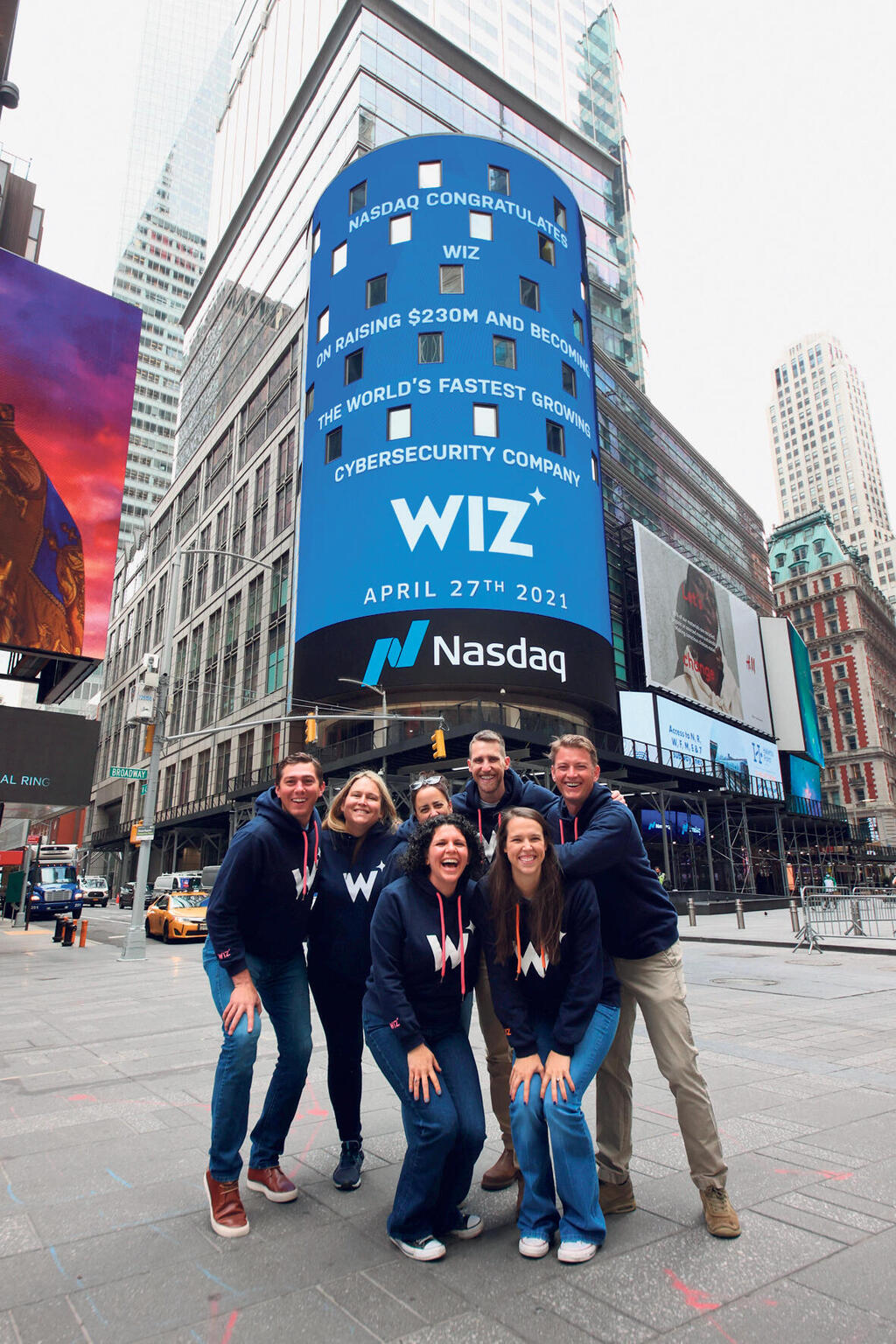
From IPO dreams to CrowdStrike’s crisis: Inside the collapse of the Wiz-Google mega deal
The timing of CEO Assaf Rappaport's announcement that Wiz was walking away from the Google deal on the eve of the giant’s earnings report indicates that he was mulling the decision until the very last moment. The fear of becoming history at the age of 40, the blow received by competitor CrowdStrike, the attempt to raise the price, and the desire for a huge IPO were probably among the considerations that tipped the scales.
The earnings report that Google will publish on Tuesday was probably supposed to contain an announcement regarding the upcoming purchase of the Israeli cybersecurity startup Wiz for $23 billion. Instead, it is likely that in the conference call with analysts, Google will respond diplomatically to the reports that it was in advanced talks to acquire the Israeli company, which ultimately fell through.
The date of the publication of the earnings report also determined the timing when Assaf Rappaport, CEO of Wiz and one of its four founders, had to send the email to employees announcing the decision to reject “offers we have received,” with Google's name not explicitly mentioned, nor the amount that was offered. The email was sent at 7:00 p.m. Silicon Valley time, so it seems that Rappaport waited until the very last moment. This is not a typical time for dramatic announcements, as a large part of the 1,200 employees of the cyber company live and work in Israel, and it was the middle of the night there. Even in New York time, the announcement came after "business hours."
Quite a few people were angry with Rappaport, and those close to him testify that he did deliberate the decision until the last minute, which also explains the puzzling time when the message was sent to the employees. Wiz employees are not necessarily among those who were angry: after distributing the spoils to all the investors and paying the taxes, they would have been left with amounts of hundreds of thousands of shekels from the deal. Although these are not small amounts, they are not considered life-changing either.
Those who work at Wiz completely identify with it and its founders and their goals. Exactly the opposite can be said today about Google, which, once twenty years ago, was like that, but over the decades has become a huge company with a lot of bureaucracy, most of whose employees do not feel that they are at the cutting edge of technology, but mainly enjoy peace of mind and pampering working conditions.
How do you turn down $23 billion?
What happened last week at Wiz? How did they refuse a $23 billion offer, and more importantly, what will happen now? The full story is known only by CEO Assaf Rappaport, CTO Ami Luttwak, VP Product Yinon Costica, and VP R&D Roy Reznik, who together own close to 40% of the shares of Wiz, which they founded four years ago. Others can only gather pieces of information and speculate regarding the reasons. Here are some of them:
The incredible valuation: The Wiz founders, who already have financial peace of mind from the exit of Adallom, which they sold to Microsoft for $320 million in 2015, have always expressed a dislike for and unwillingness to be sold. They want to make it big, go public, and become a huge cyber company like Palo Alto Networks, which has already crossed the $100 billion market cap mark. Being sold to Google means the opposite, essentially becoming history already at the age of 40, when the sale agreement obliges the Wiz founders to stay with the company for three to four years, as is customary in this type of agreement.
This may have pushed aggressive shareholders such as Andreessen Horowitz, who are used to getting what they want, to leak the deal to the Wall Street Journal and make it difficult for Rapaport & Co. to refuse an offer that really can't be refused. The Wiz decision brought up memories of famous refusals such as Mark Zuckerberg saying no to Yahoo, which wanted to buy Facebook for a billion dollars, or the late Blockbuster, which refused Netflix's offer.
But Google's offer to Wiz was not like that. The offer (or whoever leaked the negotiations) attaches to the four-year-old Israeli start-up an incredible value and a multiplier that none of its competitors come close to. Rappaport is fantasizing about an IPO and allegedly targeting a valuation of more than $20 billion, which is really a fantasy scenario given the unofficial data from Wiz, which says it recently hit an annual recurring revenue rate (ARR) of $500 million. This value reflects a revenue multiplier of 46 for Wiz, compared to 13 for Palo Alto and 16 for CrowdStrike. Even before the collapse following Friday's severe outage, CrowdStrike, the darling of cyber investors, was trading at a multiple of 20 on this year's expected revenue of $4 billion.
CrowdStrike crisis: And since we are already discussing CrowdStrike, it is not impossible that its troubles ended up becoming a blessing in disguise for Rappaport. The last week has been tumultuous at Wiz. The founders were against the transaction, while Rappaport, according to estimates, was actually less extreme as the one who is considered to be more focused on the business side and also the one who manages all the communication with the investors. On the other hand, stood the "technologists" who do not want to find themselves in senior positions, however they may be, within the giant machine of Google, which will eventually turn them too into cogs and dictate a completely different pace and focus.
The ones who pushed for the deal are the funds that own Wiz, led by Andreessen Horowitz, who first invested in the company in its latest fundraising at a value of $12 billion. In Silicon Valley, there are those who estimate that the giant fund already knew about Google's interest, and therefore entered rapidly.
On the other hand, Sequoia, Index, and Cyberstarts, the first investors in Wiz who actually built the company together with Rappaport, were more attentive to the founders from the beginning. According to sources around Wiz, there was no meeting with an actual vote of the company's board of directors, but Rappaport had separate conversations with each of the senior partners and in the end received their blessing to send the nightly email to employees. The relevant partners are the big names of the global venture capital industry: Doug Leone from Sequoia, Shardul Shah from Index, Jeff Horing from Insight, and two representatives of the Israeli Cyberstarts fund: Gili Raanan, who is officially designated as chairman, and Emily Heath, who joined the fund about a year ago.
Rappaport wasn't on board with the deal to begin with, but he knew it was an offer he couldn't refuse outright. The debacle of CrowdStrike, one of its most important competitors and a role model, which brought down Microsoft's operating system, provided Rappaport with a boost and a window for an even higher valuation. It illustrated to the whole world the excessive dependence on Microsoft on the one hand, and on the other hand created a comfortable platform to challenge CrowdStrike in the competition both for the attention of customers and for potential investors on Wall Street.
Attempt to raise the price: Although the immediate headlines announced today about the "collapse" of the deal, it is not necessarily the end of the story. It's possible, as Rappaport must have told his investors, that a higher offer may soon be forthcoming. It could be Google that will improve the price, but also Amazon or even Microsoft again, which already has great experience with purchases from Rappaport & Co. after Adallom, and for them it is also about taking down a significant competitor.
Although many raised doubts about the potential approval of the antitrust regulators for the acquisition of Wiz by Google, in practice it may have well not been such an issue. One reason is related to the fact that Wiz is a cyber company, which means that it operates in a very decentralized market in which no one company holds more than a few percent. Also, the timing of the transaction may indicate that both Google and Andreessen Horowitz, who came out openly in support of Donald Trump's candidacy for the presidency, feel that the days of the aggressive Lina Khan as Commissioner of the United States Federal Trade Commission are numbered. After the U.S. elections, she will be replaced, and the FTC will be less militant towards the big tech companies.
Ironically, the general public in the world became aware last week for completely different reasons of the existence of two cyber companies: CrowdStrike and Wiz. The very fact that a four-and-a-half-year-old start-up from Israel received headlines all over the world has already created for Rappaport & Co. the image they are always looking for: a company that plays in the field with the big boys.
IPO: The big question now is whether the image and the experience, straight from behavioral economics theories, to create a new "anchor price" for Wiz, will be enough to issue it at a value that will be higher than $23 billion. It will take a 2021 frenzy in the financial markets and some interest rate cuts for Wiz to get there. Wiz is a phenomenal company, but the value that Google offered it is also phenomenal. It is not certain that it will be able to receive it soon from the public. Beyond the dry issue of multiples and losses that are still high, Wiz is not yet ready for an IPO at the level of its corporate governance. It needs an organized board of directors, it needs to appoint a CFO, and it needs to start conducting itself more like a "corporation" than a "start-up."
The 2021 IPOs showed perfectly what happens to companies that issue too early. Rappaport wrote in his letter that the goal now is to reach a sales rate of one billion dollars in preparation for the IPO, and even those around Wiz admit that this will not happen this year, but only next year. It is possible that the IPO market will be very hot in 2026 and it is hard to believe that Wiz will reach Wall Street before then, but on the other hand, one and a half to two years is a long time in high-tech, just as Wiz has taught its competitors.
The competition in the cyber cloud market is already very tough today, with Palo Alto, CrowdStrike, and other companies also fighting for market share, and, among other things, playing hard on pricing. Wiz's product is considered excellent, but it has to price it for the hard war. Also, Wiz currently does not have additional legs to carry its technological solution, and it will have to make acquisitions to get there. Beyond that, there is the weight of the Israeli Orca's patent lawsuit, which claims that Wiz copied the technology from it. Despite Wiz's attempts to cancel the lawsuit, it is scheduled to be heard in a U.S. court in about a year and a half.
For the State of Israel, in the long term, it is better for Wiz to remain independent so that it can continue to employ workers here and expand, become a buyer itself, and contribute to the national pride of "Here, we have another giant company." But right now the state treasury needs cash to cover the war deficit, therefore, in short-term thinking, it is better to sell. Even if Wiz is issued according to the value it dreams of, it is already an American company with all its intellectual property registered in the USA, so it will also continue to expand faster there.
Wiz's well-oiled marketing machine: It should not be overlooked that Wiz is now walking on very thin ice when it comes to reputation and credibility. Because of past leaks designed to create a reality in which Wiz is much bigger than it is - as in the case where it allegedly wanted to acquire SentinelOne and Lacework, companies larger than it, there are those who do not believe that there was an offer from Google. Conversations with people who comment on the issue from both directions indicate that the offer was indeed made and that the deal was almost signed. Of course, everyone benefited from the leak, including Google, which signaled its determination to be innovative and an aggressive buyer.
But the biggest gain is undoubtedly Wiz's, which even in leaking about the "collapse" of the negotiations set the narrative that it turned down the offer and that its founders and shareholders believe it could be even bigger. For example, no one even raised the possibility that Google might have found something it didn't like in the Wiz due diligence process. But Wiz won't be able to repeat the trick again, otherwise doubts will start to gnaw even about the numbers it provides about its performance.
There is no doubt that its technology is excellent, but more than that, Wiz has built a marketing and branding machine that few in Israeli and global high-tech know how to create. This is part of the company's genius and is also due to the fact that its founders learned the language when they were inside Microsoft. But all its behavior in the last year, which was intended to inflate its value, could come back to haunt it.















